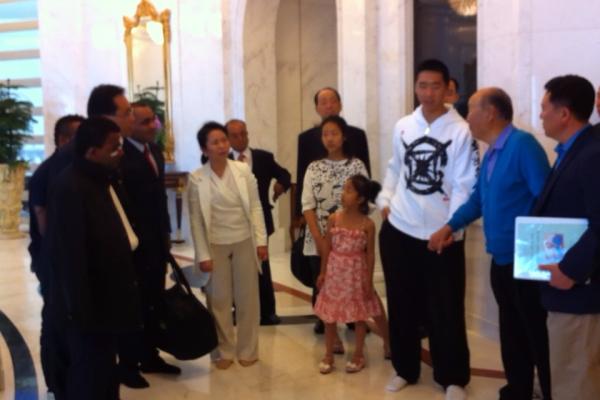![]()
The Words of Sun Myung Moon from 2012
|
|
The Words of Sun Myung Moon from 2012 |
Sun Myung Moon
June 16, 2012
Cheon Jeong Gung
Korea
April 27, H.C.

NOTE: These notes are taken from a Peace TV video clip. They
cannot be published as definitive texts and should never be used in
the future as an "official" publication of True Father's
words. However, they do provide a good idea of the "spirit"
of the message. - Rev. Katsumi Kambashi "What
is left to be done now? What is it? 'My aspiration,
desire, and victory' will disappear since it didn't
start from God but from Satan."
(@lovintp) 오늘의
훈독회 빵을 중심삼고
배급해서 통일을 하자하는
것이 공산주의입니다 우리의
통일은 사랑을 중심으로
통일하자하는 것입니다아주
(@lovintp
in English) Today's Hoon Dok Hoe: "The proposal to bring
unification by giving out rations of bread is Communism. Our proposal
is to bring unification centered on love." Aju
[From the Twitter account of
International President Hyung Jin Nim and Yeon Ah Nim on June 16, 2012. Tongil
Foundation]
"World
of heart (심정세계).
정
(情
/
Jeong: emotion, heart, or love). Say 정.
We say 정말
(Jeong
Mal) (Katsumi: the Chinese character of '정
/
jeong' is conventionally '正'
and as it indicates '정말'
means 'real' or 'really.' But Father interprets the
world '정'
with '情:
emotion, heart or love' and means the 'word of heart'
by saying '정말.')"
"Say
누시엘
(Nushiel:
Lucifer). Who is Lucifer, archangel or a servant of
the angelic world? 누
is
'類
(류
/
Ryoo)' which means 'humankind (인류
/
人類).'
시
is
'씨
(Shi:
seed).'"
"Was there sperm in
God?"
"An amazing thing about
Christianity is that they say 십자가
(十字架
/
Ship Ja Ga: cross). Ship Ja Ga. It means that after
making the cross, they build the house there without
leaving. (Katsumi: the Chinese character of '가
/
Ga' of '십자가
/
Ship Ja Ga' is 架
(Ga:
wall shelf or rack) but Father interpret '가
/
Ga' as '家
/
Ga: house.')
"Don't rely on me. I threw
away my father and mother. I threw away all my
brothers and sisters. I threw away my wife and
children."
(To sisters) "Do you
admire me or love me?"
"The principle
of Happy Health machine is the principle of plus and
minus, which deals with 상치
(Sangchi:
conflict) and 상응
(Sangeung:
correspondence). Before marriage, men can be united
with each other and so can be women. But after
marriage, a man is detached with other men since he is
with a woman."